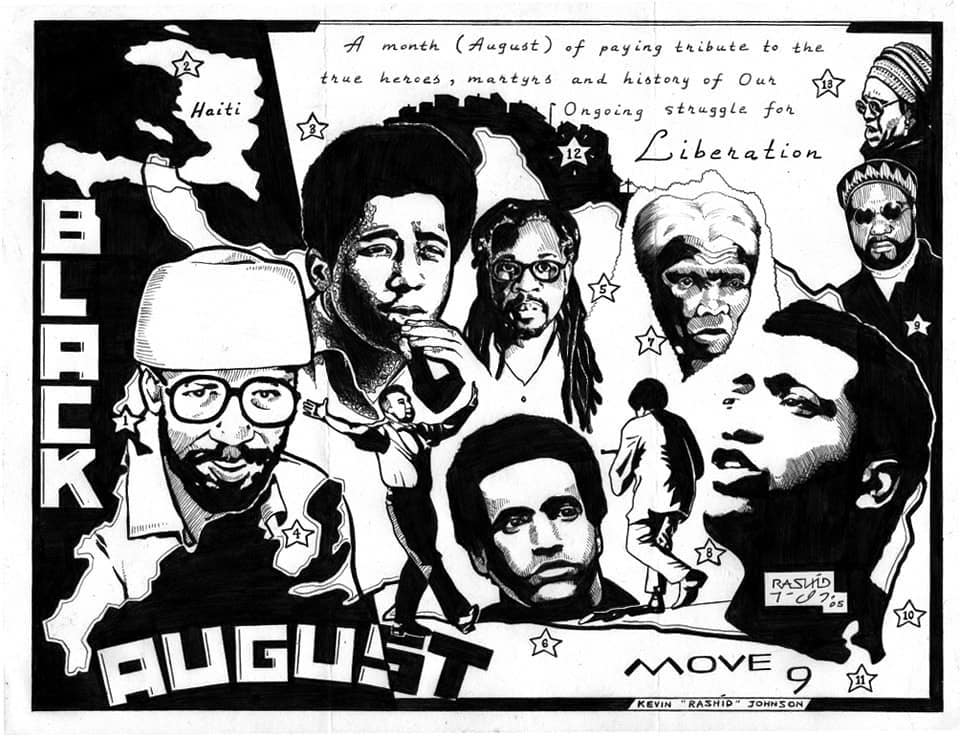On August 15, a coalition of national and local organizations held a press conference in front of the Federal Courthouse in Tucson to call for the exoneration of political prisoner Jamil Al-Amin — formerly known as H. Rap Brown — who has been imprisoned for nearly 20 years after being wrongfully convicted for a crime that another man has repeatedly confessed to committing.
The long-time Black revolutionary and human rights activist, who served as chairman of the Students Nonviolent Coordinating Committee during the 1960s and later as Minister of Justice for the Black Panther Party, is currently being held in a federal prison in Tucson. Jamil Al-Amin is now 77-years old and recently became legally blind after the Federal Prison System denied him cataract surgery for three years. Through public pressure, he had already received treatment in one eye just a few weeks before the event, but still required surgery on his second eye.
Students for Imam Jamil, Black Lives Matter Phoenix Metro, Mass Liberation, the Arizona chapter of the Council on American-Islamic Relations, the Party for Socialism and Liberation, and other organizations sponsored the event and called on the federal government to provide proper medical treatment for the civil rights leader. They also demanded he be transferred back to the custody of the State of Georgia so that he can be exonerated and freed for a crime that he did not commit.
In a major victory, as of August 21, Students for Imam Jamil confirmed on social media that Jamil Al Amil’s eyesight had been fully restored after he received surgery on August 18, just three days after the protest in Tucson.
Free Jamil Al-Amin!
Jamil Al-Amin’s son, Kairi Al-Amin, one of the speakers at the press conference and organizer campaigning for his father’s freedom said: “We should have never come to Tucson. My father is not a federal prisoner. And so, while we are talking about guilt and innocence and exoneration, we have to talk about fairness. He hasn’t been able to participate in his own defense in 21 years.”
On March 16, 2000, Imam Jamil Al-Amin was falsely accused and arrested of shooting two police officers in Fulton County, Ga., wounding one and killing the other. He was arrested, tried, and convicted to a life sentence in 2002. Although he appealed to the U.S. Supreme Court, they declined to hear his case. At the same time, another man, Otis Jackson, confessed to the shooting, but the confession was not admitted at Al-Amin’s trial, even though he fit the physical description given by the wounded officer and had bullet marks from where the officers shot him. Jackson has been consistent with his confession and even admitted to the crime under oath in another trial in 2016. At this moment, Jamil Al-Amin’s case is being reviewed by the Fulton County District Attorney’s Conviction Integrity Unit in Atlanta, which holds the power to overturn the entire case or give him a new trial, but as Kairi states, “It’s impossible for us to win that without him being a part of the defense. So that is one of the main reasons we felt we had to come have this demonstration.”
Held in a federal prison in Tucson, away from his family and attorneys, and with an unofficial gag order placed on his case that prevents him from speaking to the public, he has successfully been cut off from the outside world. The state’s mistreatment of Imam Jamil, including holding him in solitary confinement for over 16 years and denying him medical attention he desperately needed, has exacerbated his chronic health issues. The goal of the state is to let him die in prison, turning him into another martyr and erasing him from history as a Black and Muslim liberation fighter who helped uplift his community and threatened the status quo.
A lifetime of fighting the system
It was in the mid 1960s under the name H. Rap Brown that Jamil Al-Amin became a prominent activist, most known for succeeding Stokely Carmichael as chairman of SNCC and guiding the organization to focus on human rights issues and Black power. In 1971, he was targeted by the FBI and sentenced to 5 to 15 years in prison after he was wounded in a shootout with police in New York City. While in prison, he studied the tenets of Islam, changed his name and embraced the new religion. In 1976, after he won parole and was released, he moved to Atlanta and dedicated his years to building and leading a national network of Muslim communities, working to uplift his underdeveloped Atlanta West End neighborhood. The FBI would continue to surveil him, searching for reasons to arrest and charge him. They concocted his “crime” in the early 2000s and sentenced him to life imprisonment in 2002. Jamil Al-Amin is one of the numerous revolutionaries that were targeted and persecuted by COINTELPRO, a counter-intelligence program developed by the FBI in the 1960s that sought to destroy radicals and militant groups, particularly those within the Black liberation movement.
We should not allow the U.S. government to silence Jamil Al-Amin and erase his revolutionary legacy. Not only is he innocent and deserves to return to his family and community, but his freedom would be a significant step forward in the struggle against mass incarceration. We must fight to free all political prisoners as they have inspired entire generations to fight back. The press conference ended with supporters chanting, “Free Imam Jamil Right Now!” They called on the public to continue bringing awareness to his story and to fight for his exoneration and liberation. You can visit freeimamjamil.com to learn what actions you can take to help Jamil Al-Amin return home.







